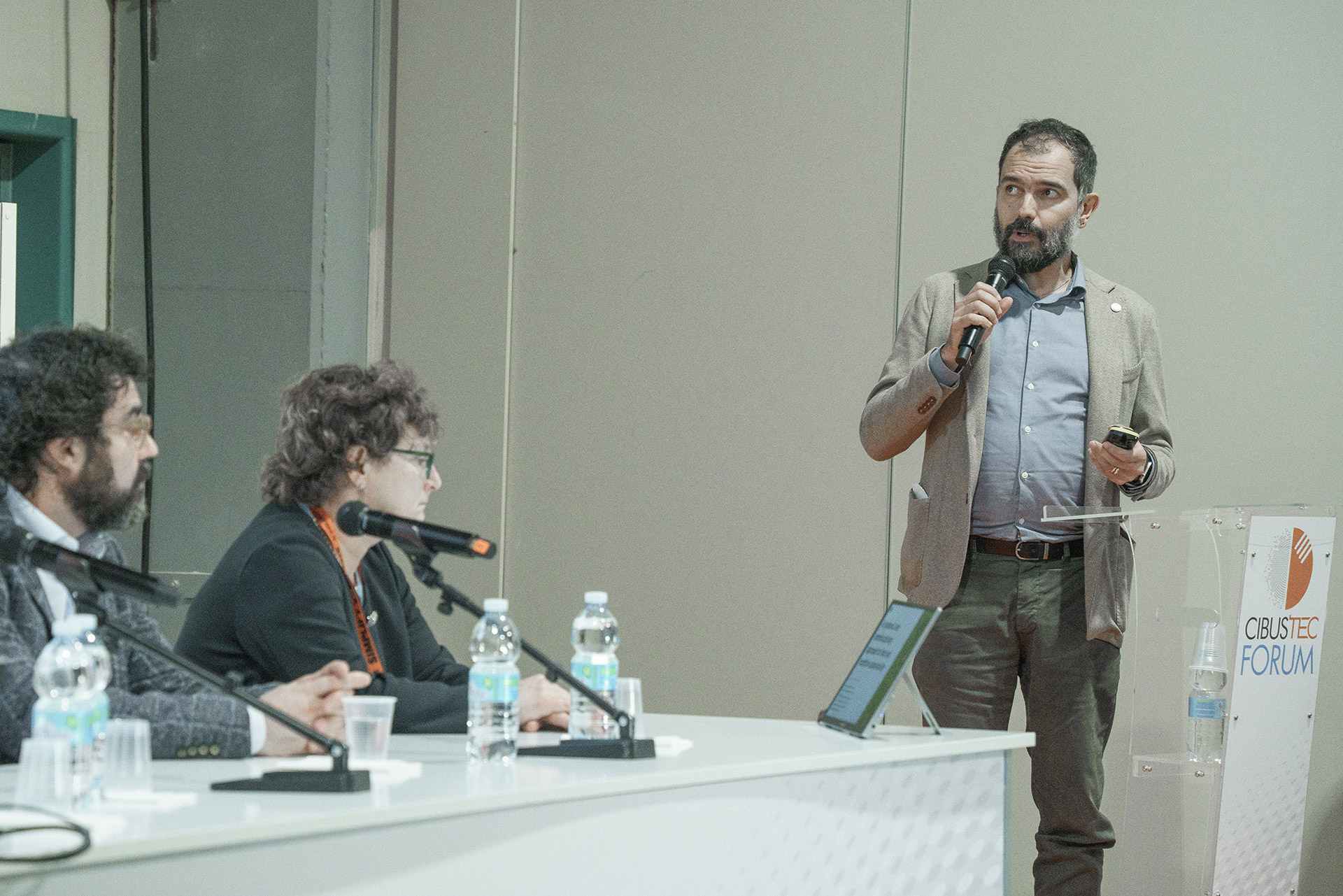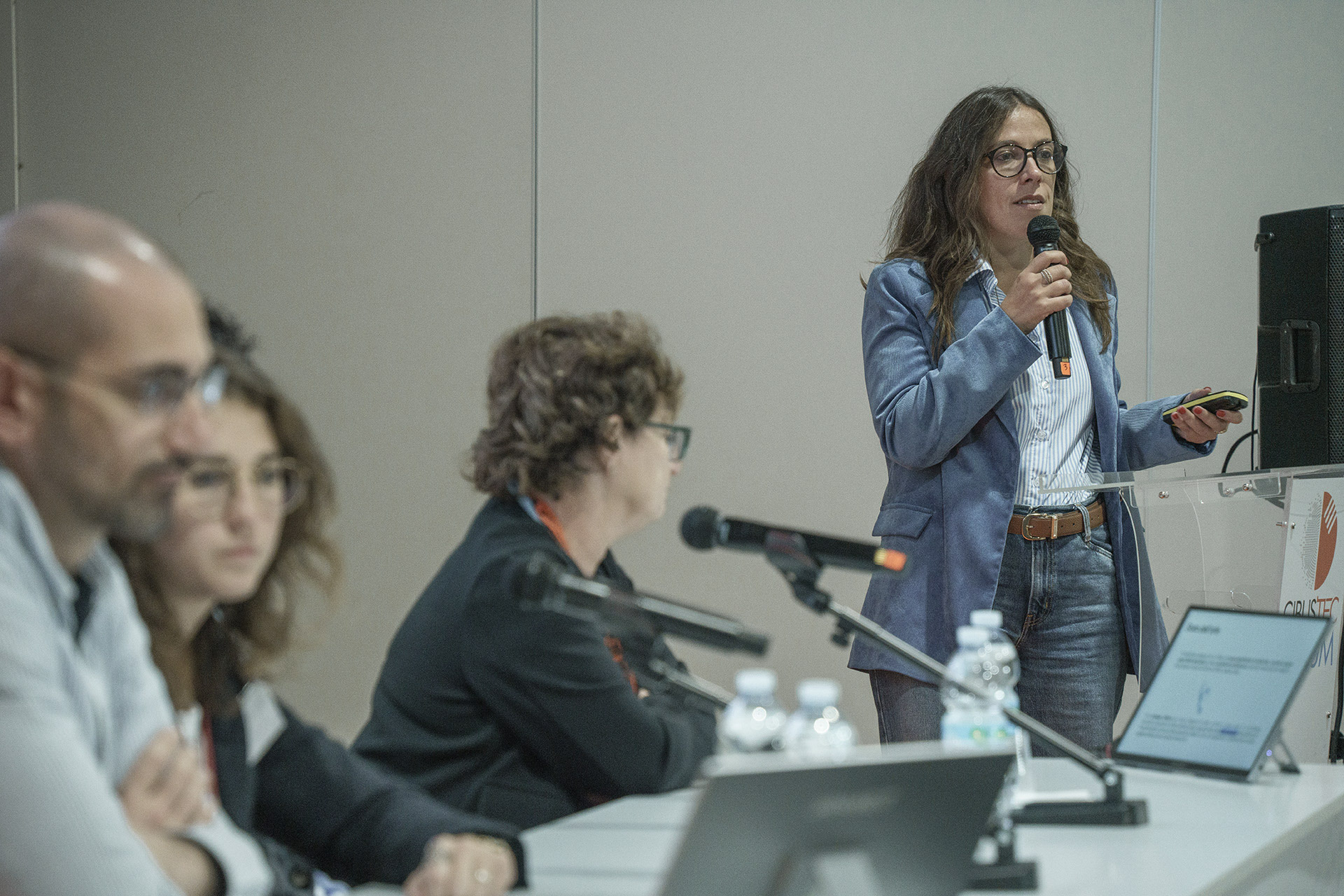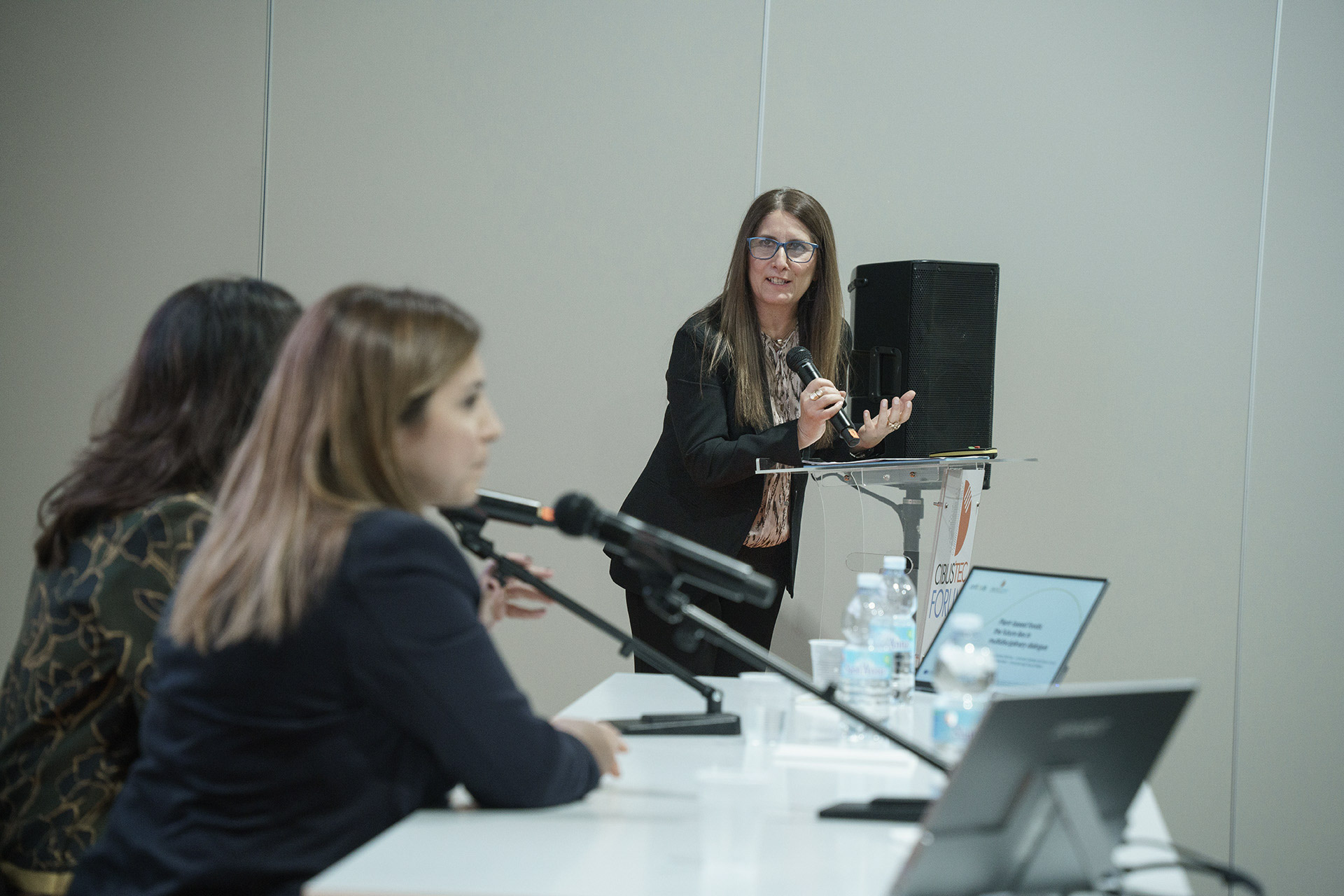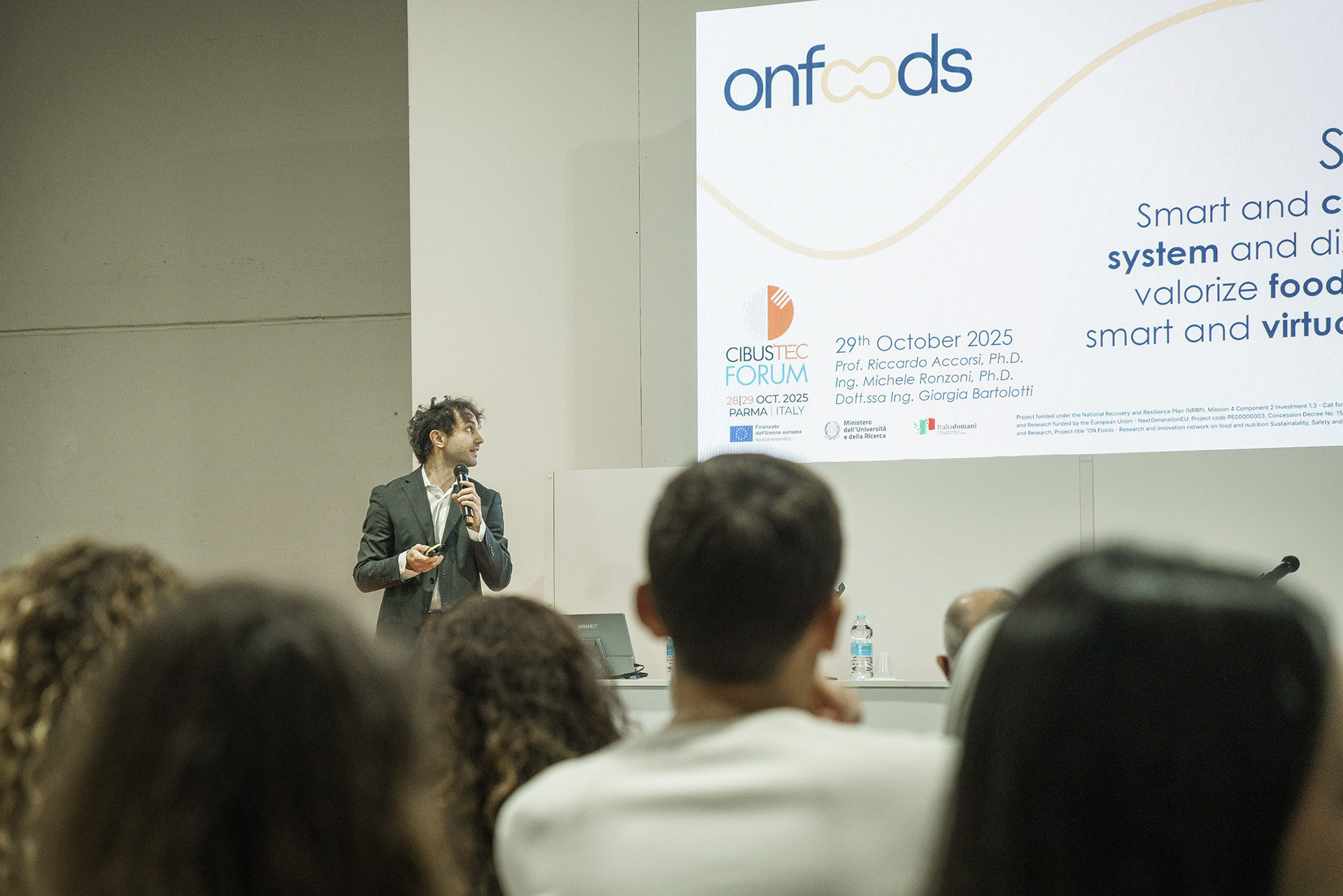Funded under the National Recovery and Resilience Plan (NRRP), Mission 4 Component 2 Investment 1.3, Theme 10.
At Cibus Tec Forum 2025, OnFoods presented a concrete, scientifically grounded vision for the future of food: more sustainable, safer, and smarter.
In the heart of the Food Valley, during the international event organised by Koeln Parma Exhibitions – a joint venture between Koelnmesse and Fiere di Parma – Italy’s largest food research ecosystem showcased results, innovation models, and perspectives capable of making a real impact on both industry and consumers’ lives.
With its exhibition-conference format, rich in content, networking and technological demonstrations, Cibus Tec Forum confirmed itself as a strategic platform for knowledge transfer between research and the production chain. In this context, OnFoods offered a unified narrative of the major challenges reshaping the global food system: from the valorisation of by-products to the reformulation of healthier products, from personalised nutrition to intelligent logistics combating food waste.
For Prof. Daniele Del Rio, President of the OnFoods Foundation, this collaboration has demonstrated the power of research and innovation to reshape the food industry with both scientific rigour and social responsibility.
“All the talks we’ve heard over these two days at Cibus Tec Forum have shown us how technological innovation in the food sector is an essential tool to improve quality, safety and healthfulness — and certainly not an enemy to be feared”, says Del Rio. “Frameworks such as the NOVA system have been useful in raising awareness about food processing, but when interpreted too rigidly, they risk overlooking the positive role that technology can play in enhancing nutrients, safety and sustainability.”
As research advances, the challenge is to design products that are nutritionally balanced — with less salt and sugar — while maintaining flavour and quality, and at the same time reducing energy use and emissions.
“It’s time to move beyond the simplistic idea that opposes ‘natural’ to ‘processed’ foods”, continues Del Rio. “What truly matters is the composition of the final product and the purpose of the technological intervention, which should always aim to improve the product from every point of view, including its nutritional profile. The goal of OnFoods is also to make safe, high-quality food available to a growing number of people — even those far from production areas — while reducing inequalities and waste along the supply chain, always keeping sustainability at the heart of our mission.”

Food quality and nutrition: towards sustainable and personalised diets
One of the cornerstones of OnFoods’ work is the reformulation of existing products with the aim of improving their nutritional quality without compromising the pleasure of consumption. Prof. Daniela Martini of the University of Milan explained how reducing sugar, salt, and fat — in line with international benchmarks — can generate significant public health benefits, particularly through widely consumed foods such as baked goods and snacks.
This work goes beyond reducing critical ingredients, also including enrichment with fibre and bioactive compounds, thereby contributing to a tangible and sustainable improvement of the daily diet.
“We start from a concrete fact: the intake of sugar, fat, and sodium in the Italian population still exceeds recommended levels” explains Martini. “With the EFFORT project, we are demonstrating that it is possible to reformulate food products by reducing critical ingredients while simultaneously increasing beneficial components such as fibre and bioactive compounds, maintaining taste, accessibility, and economic sustainability. Through a multidisciplinary approach, we have mapped high-consumption categories — from baked goods to fish analogues and plant-based foods — showing how innovation can generate real public health benefits without requiring sacrifices from consumers.”
 The growing demand for foods offering specific health benefits opens new frontiers for the food industry. Dr Fabio Dal Bello, Scientific Director of Sacco S.r.l. (Sacco System), presented innovative solutions in the field of fermented beverages containing postbiotics, developed to combine nutritional value, industrial stability, and sensory enjoyment.
The growing demand for foods offering specific health benefits opens new frontiers for the food industry. Dr Fabio Dal Bello, Scientific Director of Sacco S.r.l. (Sacco System), presented innovative solutions in the field of fermented beverages containing postbiotics, developed to combine nutritional value, industrial stability, and sensory enjoyment.
These studies fit within the broader framework of personalised nutrition, where food becomes an active tool for prevention and well-being, capable of meeting the specific needs of different population groups.
“The fermented beverages market is rapidly expanding because more and more people are seeking products that combine taste, wellness, and sustainability” comments Dal Bello. “With our research team at Sacco System, we are contributing to the OnFoods project by developing a new generation of fermented beverages based on postbiotics, that is, inactivated microorganisms which retain their beneficial effects without the shelf-life limitations of live cultures. Through specific fermentation processes, we naturally reduce sugars, enrich the nutritional profile, and obtain stable products that are easily industrialisable. This is a concrete example of how microbiological innovation can translate into real solutions, accessible to consumers and capable of generating a positive impact along the entire food chain.”
The plant-based food sector is also experiencing significant growth, responding to the demand for more sustainable and healthy products. Within OnFoods, several projects are working to improve both the nutritional and sensory characteristics of these foods, making them closer to consumer expectations.
“Plant-based foods represent a valid alternative to those of animal origin, and consumer interest continues to grow", explains Prof. Margherita Dall’Asta of the Catholic University of the Sacred Heart. “From a nutritional point of view, they can provide great benefits, but it is essential that they are also tasty and appealing.”
“To achieve this result, we need to rethink formulation, improving texture, taste, and nutritional properties", adds Prof. Alessandra Marti of the University of Milan. “With projects such as PRINCE, we valorise new plant-based ingredients like buckwheat and sorb, while with COURAGE we work on reformulating plant-based meat analogues, making products more sustainable, safe, and appealing. The ultimate goal is to create plant-based alternatives that are truly competitive and enjoyable for consumers.”

Logistics and digitalisation: reducing waste along the supply chain
Food waste represents one of the greatest challenges in the global food system. Losses along the supply chain, often caused by logistical inefficiencies, temperature fluctuations or inadequate packaging, can be significantly reduced through advanced digital technologies. The DISCO project examines the journey of fresh produce from harvest to final destination, considering every stage in the process. Each ingredient is linked to a process, generating waste that can potentially be transformed into new resources, while an integrated approach evaluates availability and origin to enable more sustainable transport decisions.
“Transport routes for food products are often complex and expose goods to shocks, impacts and temperature fluctuations. All factors that can compromise quality and turn food into waste,” explains Dr Michele Ronzoni of the University of Bologna. “With the DISCO project, coordinated within the Food Supply Chain Center, we employ both digital and physical twins to monitor and simulate real transport conditions — vibrations, temperature, humidity — and test how packaging and logistics affect the final product. This allows us to identify more sustainable, efficient solutions across the entire supply chain.”
By combining these technological insights with predictive data analysis, the project provides a comprehensive view of where losses occur and how they can be prevented.
“Food waste doesn’t just mean losing food — it also represents a loss of energy, raw materials and human labour,” continues Ronzoni. “By using advanced sensors and big data systems, we can predict when a shipment is at risk of being damaged or spoiled and intervene before it happens. Sustainability is built in the details: in the sensors, in the data, in the simulations that reveal what is usually invisible in logistics.”
 As the linear economic model — extract, produce, consume, discard — reveals its limits, the circular economy emerges as a crucial strategy for transforming food production residues into new resources. In Italy alone, the agro-food sector generates vast quantities of by-products and waste that can be repurposed into high-value materials, biodegradable inputs, energy, or natural fertilisers. Understanding how to extract, characterise and employ bioactive compounds and macromolecules from these streams is essential to combine circularity with genuine sustainability.
As the linear economic model — extract, produce, consume, discard — reveals its limits, the circular economy emerges as a crucial strategy for transforming food production residues into new resources. In Italy alone, the agro-food sector generates vast quantities of by-products and waste that can be repurposed into high-value materials, biodegradable inputs, energy, or natural fertilisers. Understanding how to extract, characterise and employ bioactive compounds and macromolecules from these streams is essential to combine circularity with genuine sustainability.
“Circularity does not automatically mean sustainability,” explains Dr Lucrezia Lamastra of the Catholic University of the Sacred Heart. “To evaluate whether a process is truly sustainable, we rely on Life Cycle Assessment (LCA) which allows us to measure environmental impacts across key categories. Only through such rigorous analysis can we ensure that valorising food waste generates real benefits without unintended consequences.”
For example, the ON_TRADE project, coordinated by the Università Cattolica in collaboration with CNR and the Universities of Bari and Milan, applies this LCA-driven approach to innovations in agro-food circularity under OnFoods’ Spoke 2. The project’s dual objectives are to provide objective assessments of environmental performance for new processes and products, and to identify policy tools and fiscal levers to support businesses in transitioning towards more sustainable models.
“We have evaluated the sustainability of specific extraction processes, identifying the most promising ones, and developed an integrated matrix that considers environmental, economic and social aspects,” continues Lamastra. “This matrix highlights critical areas for implementing circular economy initiatives, taking into account logistics, process characteristics, market interest in the final product, and regulatory constraints. Innovation only delivers sustainability when its impact is assessed across the entire life cycle, from resource extraction to end-of-life management.”
New methods for recovering bioactive compounds from food waste are becoming central to the circular economy agenda. In OnFoods, projects like EXTRABIO and CHARACTER_BIO explore how to transform agro‑food by-products into valuable resources, contributing to sustainability and innovation across the food chain.
“Through our work, we focus on turning food by-products and waste into valuable compounds that can enhance food quality, safety and functionality", says Dr Francesca Annunziata of the University of Milan. "We do this by developing mild and downstream extraction protocols to recover bioactive compounds from diverse agro‑food residues, employing techniques such as CO₂ supercritical extraction, green solvents, ultrasonics and microwave assistance. The aim is to demonstrate that what is often considered waste can become a resource, supporting more sustainable and efficient food systems.”
Food safety and innovation: assessing, preventing, and controlling risks
Ensuring food safety is one of the main goals of OnFoods’ mission, particularly as new technologies and novel ingredients transform the food system. Spoke 3 focuses on identifying, assessing, and mitigating both emerging and re-emerging risks — from chemical contaminants and mycotoxins to microorganisms and genome-edited bacteria — across the entire supply chain. By integrating advanced analytical techniques, meta-omic approaches, and innovative processing and packaging solutions, researchers aim to make innovation and safety go hand in hand.
“In OnFoods, we adopt a One Health perspective when evaluating risks”, says Prof. Piersandro Cocconcelli of the Catholic University of the Sacred Heart. “Our work covers xenobiotics, mycotoxins, genetically modified organisms, and microbiological risks. Understanding these threats allows us to design strategies to prevent them while supporting the development of safe and innovative food products.”
Our research in Work Package 3.3 focuses on advanced methods for food safety,” explains Prof. Maria Careri of the University of Parma. “We evaluate safety parameters in both traditional and novel foods using chemical and immunological sensors, portable spectroscopy devices, high-resolution mass spectrometry, and PCR-based techniques to detect toxins, allergens, and foodborne pathogens. Beyond laboratory methods, we are developing digital solutions such as smart labels and IoT platforms to monitor food quality and traceability in real time. This integrated approach allows us to innovate continuously in food safety and ensure that new technologies are both reliable and practical for the industry.”
Conclusions
OnFoods’ participation in Cibus Tec Forum 2025 has reaffirmed the central role of Italian research in driving innovation across the food sector. From plenary talks to one-to-one meetings with companies, the forum provided a unique opportunity to strengthen the connection between research and industry, fostering production models that are healthier, more traceable, and sustainable.
The event demonstrated how OnFoods serves as a benchmark for combining scientific excellence, technological innovation, and social impact. By integrating advanced research, practical solutions, and cross-disciplinary collaboration, OnFoods contributes to reshaping both the Italian and global food systems, ensuring that innovation translates into tangible benefits for consumers, producers, and the environment alike.
This blog post is related to
Smart and circular food system and distribution
To valorize food waste and smart and virtuous logistics
Food quality and nutrition
To push towards sustainable and tailored food and nutrition
Extraction of bioactive compounds and/or macromolecules from food by-products and wastes
Principal investigators
Referred to
Spoke 02Environmental performances of new products/procesess
Principal investigators
Referred to
Spoke 02Product and process innovation of cereal-based products
Principal investigators
Referred to
Spoke 04Reformulation of food products
Principal investigators
Referred to
Spoke 04Food safety of traditional and novel foods
Promoting a safe food innovation
Principal investigators
Referred to
Spoke 04Principal investigators
Referred to
Spoke 02Principal investigators
Referred to
Spoke 02Technological and nutritional reformulation of meat analogues
Principal investigators
Referred to
Spoke 04


